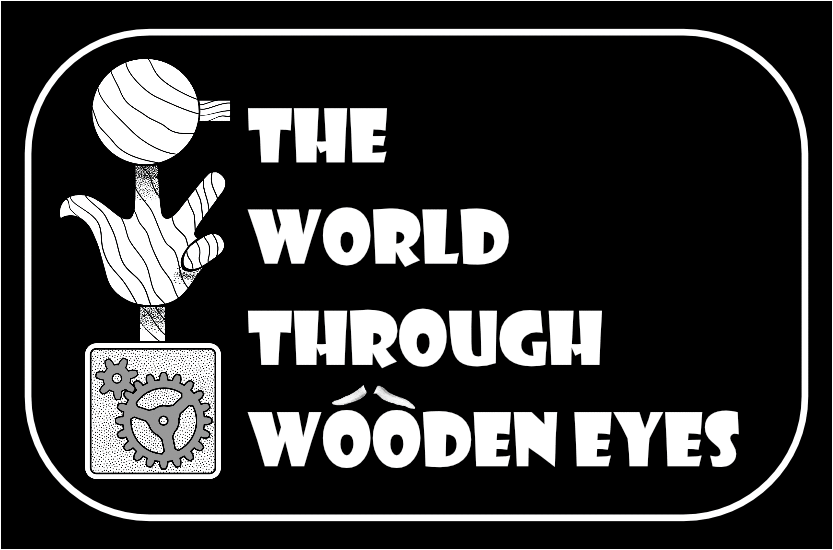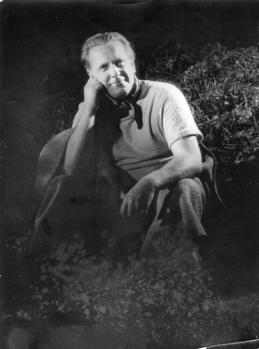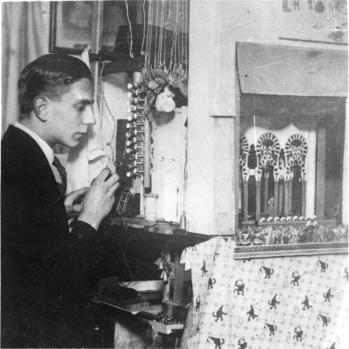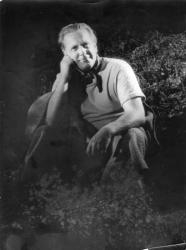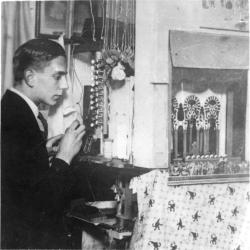NAVIGATION
SOCIAL
CONTACT
e-mail: info@theworldthroughwoodeneyes.co.uk

During
dialogues
with
puppeteers
it
is
often
interesting
to
note
how
many
are
not
familiar
with
the
names
of
the
personalities
and
founders
of
The
British
Puppet
and
Model
Theatre
Guild
,
let
alone
what
they
actually
did.
It
is
not
just
a
question
of
talking
history,
it
is
important
to
understand their motivation and their passion for what they did in practical terms and why.
There
are
two
key
personalities
that
inspired
the
formation
of
The
Guild,
Harry
W.
Whanslaw
,
and Gerald Morice.
One
of
the
most
enthusiastic
individuals
was
Gerald
Morice,
often
referred
to
by
Whanny
as
‘the
lad,
‘Gerrymiya’.
Gerald
was
from
an
aristocratic
family
related
to
the
Butlin
family,
of
holiday
camp
fame.
As
a
young
man
he
loved
spending
his
time
with
a
very
elaborate
model
theatre,
he
also
collected
the
sets
of
sheets
for
plays
and
pantomimes
published
by
the
popular publishers of this special art.
Gerald’s
enthusiasm
for
the
toy
theatre
led
him
to
write
to
Whanny
suggesting
the
possibility
of
meeting
to
discus
the
gathering
of
friends
of
the
toy
theatre.
Gerald
borrowed
the
half-
crown to hire a hall for the first meeting - the rest is history
Gerald
Morice
was
an
extraordinary
character
in
so
many
ways.
Journalist,
theatre
critic,
co-
founder
of
the
British
Puppet
and
Model
Theatre
Guild,
its
first
secretary,
Press
Officer,
Editor
of
‘Wartime
Bulletin’s’,
and
‘The
Puppet
Master’
from
1950
-
1952.
He
was
a
member
of
The
Joint
International
Committee
of
B.P.M.T.G.,
E.P.A.
later
British
UNIMA
of
which
he
was
the
Founder
Patron.
He
was
also
a
member
of
the
International
Executive
Committee
of
UNIMA.
For
a
number
of
years
before
and
after
the
War
Gerald
also
organised
study
tours
of
continental puppet theatres.
Besides
his
love
of
the
juvenile
drama,
and
puppet
theatre,
he
was
passionate
about
the
history
and
development
of
the
popular
theatres
and
music
halls
of
London.
He
collected
matchbox
labels,
and
other
paper
ephemera,
he
had
extensive
collections
of
Easter
and
Valentine
cards,
and
was
a
major
authority
on
these
subjects,
frequently
giving
talks
on
radio
and
television
on
the
subject.
He
spoke
French
and
an
aristocratic
form
of
‘high
German’,
that
baffled
the
Germans
who
could
never
understand
how
he
learned
it.
He
was
a
journalist
and
theatre
critic,
here
and
abroad,
and
during
the
Second
World
War
was
the
BBC
Correspondent
in
Vienna.
He
was
also
one
of
leading
authorities
on
the
productions
of
the
Vienna
State
Opera;
particularly
the
operettas.
For
many
years
he
wrote
two
weekly
newspaper
columns
about
the
puppet
theatre;
one
in
the
‘Worlds
Fair’,
the
showman’s
journal,
with
the
title
‘Punch
and
Puppetry
Pars’,
by
Gerald
Morice.
The
other
in
‘The
Stage’,
under
the
name
Charles
Trentham,
his
middle
names.
Not
only
did
he
write
about
the
British
puppetry
scene,
he
also
wrote
extensively
about
Eastern
and
Central
European
puppets,
ancient
and
modern.
He
was
the
first
correspondent
into
Czechoslovakia
after
the
war,
where
he
continued
his
friendship
with
Jan
Malik,
and
was
involved
with
him
in
reforming
UNIMA.
He
was
also
involved
with
the
establishment
of
the
Puppet
Theatre
Museum
in
Munich,
with
his
friend
Ludwig
Krafft.
Gerald
translated
the
Museum
catalogue
into
English;
it
is
one
of
the
best
books
on
museum
collections.The
Salzburg
Marionette
Theatre
undertook
a
number
of
tours
in
the
UK
performing
in
many
major
theatres,
and
Gerald
worked
as a ‘PRO’ and interpreter for the company; he also translated all of the texts of the productions that were seen during the tours.
Gerald’s
love
of
popular
theatre
and
the
family
marionette
theatres
of
the
19th
century
led
him
to
be
offered
the
Tillers
Clowes
Marionette
Troupe.
Due
to
his
Wartime
commitments,
his
close
friend,
George
Speight,
went
to
view
the
marionettes,
and
ultimately
rescued
them,
and
later
restored
the
figures,
and
undertook
the
presentation
of
them
in
The
Festival
of
Britain
Celebrations
in
London,
with
the
title
‘The
Old
Time
Marionettes’,
George
Speaight
continued
to
perform
with
half
of
the
troupe
for
many
years.
The
other
half
languished
in
a
damp
old
potting
shed
at
the
bottom
of
his
vegetable
garden
in
Malvern
until
I
rediscovered
them,
and
removed
them
from
piles
of
earth
and
old
plant
pots.
Not
only
were
there
the
marionettes,
but
also
props,
tricks,
and
stage
wings
and
back
cloths;
sadly
beyond
restoration.
They
were
later
left
to
me
by
Gerald,
with
a
vast
number
of
rare
books,
including
one
of
what
he
always
referred to as his ‘pregnant books’.
Few
people
remember
Gerald
Morice,
and
his
extraordinary
generosity,
knowledge
and
intellect.
It
was
he
who
taught
me
how
to
‘sniff
out
the
books‘,
as
he
used
to
say.
Few
also
recognise
his
influence
on
puppet
and
toy
theatre
in
the
UK
and
abroad.
He
also
became
something
of
mentor
to
Jane
Phillips
and
I,
and
gave
us
both
a
great
deal
of
support
and
encouragement
to
develop new and interesting ideas.
John M. Blundall
Gerald Morice
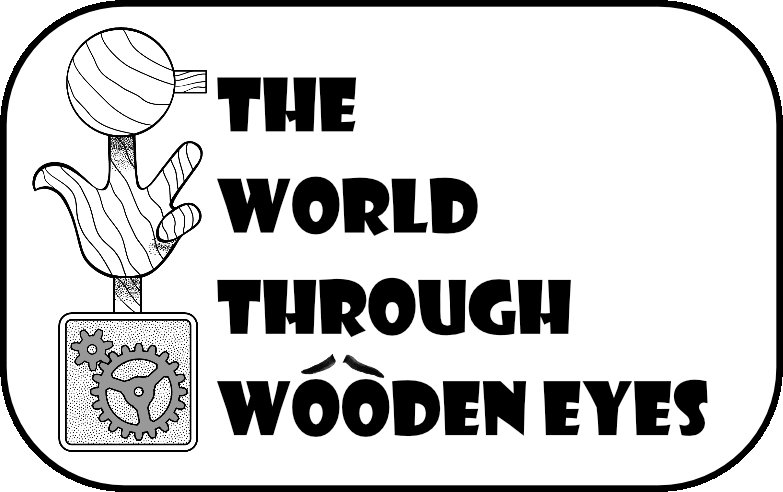
CONTACT
e-mail: info@theworldthroughwoodeneyes.co.uk
SOCIAL

During
dialogues
with
puppeteers
it
is
often
interesting
to
note
how
many
are
not
familiar
with
the
names
of
the
personalities
and
founders
of
The
Guild
,
let
alone
what
they
actually
did.
It
is
not
just
a
question
of
talking
history,
it
is
important
to
understand
their
motivation
and
their
passion
for
what
they
did
in
practical
terms
and why.
There
are
two
key
personalities
that
inspired
the
formation
of
The
Guild,
Harry W. Whanslaw
, and Gerald Morice.
One
of
the
most
enthusiastic
individuals
was
Gerald
Morice,
often
referred
to
by
Whanny
as
‘the
lad,
‘Gerrymiya’.
Gerald
was
from
an
aristocratic
family
related
to
the
Butlin
family,
of
holiday
camp
fame.
As
a
young
man
he
loved
spending
his
time
with
a
very
elaborate
model
theatre,
he
also
collected
the
sets
of
sheets
for
plays
and
pantomimes
published
by
the
popular
publishers
of
this
special art.
Gerald’s
enthusiasm
for
the
toy
theatre
led
him
to
write
to
Whanny
suggesting
the
possibility
of
meeting
to
discus
the
gathering
of
friends
of
the
toy
theatre.
Gerald
borrowed
the
half-crown
to
hire
a
hall for the first meeting - the rest is history
Gerald
Morice
was
an
extraordinary
character
in
so
many
ways.
Journalist,
theatre
critic,
co-founder
of
the
British
Puppet
and
Model
Theatre
Guild,
its
first
secretary,
Press
Officer,
Editor
of
‘Wartime
Bulletin’s’,
and
‘The
Puppet
Master’
from
1950
-
1952.
He
was
a
member
of
The
Joint
International
Committee
of
B.P.M.T.G.,
E.P.A.
later
British
UNIMA
of
which
he
was
the
Founder
Patron.
He
was
also
a
member
of
the
International
Executive
Committee
of
UNIMA.
For
a
number
of
years
before
and
after
the
War
Gerald
also
organised study tours of continental puppet theatres.
Besides
his
love
of
the
juvenile
drama,
and
puppet
theatre,
he
was
passionate
about
the
history
and
development
of
the
popular
theatres
and
music
halls
of
London.
He
collected
matchbox
labels,
and
other
paper
ephemera,
he
had
extensive
collections
of
Easter
and
Valentine
cards,
and
was
a
major
authority
on
these
subjects,
frequently
giving
talks
on
radio
and
television
on
the
subject.
He
spoke
French
and
an
aristocratic
form
of
‘high
German’,
that
baffled
the
Germans
who
could
never
understand
how
he
learned
it.
He
was
a
journalist
and
theatre
critic,
here
and
abroad,
and
during
the
Second
World
War
was
the
BBC
Correspondent
in
Vienna.
He
was
also
one
of
leading
authorities
on
the
productions
of
the
Vienna
State Opera; particularly the operettas.
For
many
years
he
wrote
two
weekly
newspaper
columns
about
the
puppet
theatre;
one
in
the
‘Worlds
Fair’,
the
showman’s
journal,
with
the
title
‘Punch
and
Puppetry
Pars’,
by
Gerald
Morice.
The
other
in
‘The
Stage’,
under
the
name
Charles
Trentham,
his
middle
names.
Not
only
did
he
write
about
the
British
puppetry
scene,
he
also
wrote
extensively
about
Eastern
and
Central
European
puppets,
ancient
and
modern.
He
was
the
first
correspondent
into
Czechoslovakia
after
the
war,
where
he
continued
his
friendship
with
Jan
Malik,
and
was
involved
with
him
in
reforming
UNIMA.
He
was
also
involved
with
the
establishment
of
the
Puppet
Theatre
Museum
in
Munich,
with
his
friend
Ludwig
Krafft.
Gerald
translated
the
Museum
catalogue
into
English;
it
is
one
of
the
best
books
on
museum
collections.The
Salzburg
Marionette
Theatre
undertook
a
number
of
tours
in
the
UK
performing
in
many
major
theatres,
and
Gerald
worked
as
a
‘PRO’
and
interpreter
for
the
company;
he
also
translated
all
of
the
texts
of
the
productions
that
were
seen
during
the tours.
Gerald’s
love
of
popular
theatre
and
the
family
marionette
theatres
of
the
19th
century
led
him
to
be
offered
the
Tillers
Clowes
Marionette
Troupe.
Due
to
his
Wartime
commitments,
his
close
friend,
George
Speight,
went
to
view
the
marionettes,
and
ultimately
rescued
them,
and
later
restored
the
figures,
and
undertook
the
presentation
of
them
in
The
Festival
of
Britain
Celebrations
in
London,
with
the
title
‘The
Old
Time
Marionettes’,
George
Speaight
continued
to
perform
with
half
of
the
troupe
for
many
years.
The
other
half
languished
in
a
damp
old
potting
shed
at
the
bottom
of
his
vegetable
garden
in
Malvern
until
I
rediscovered
them,
and
removed
them
from
piles
of
earth
and
old
plant
pots.
Not
only
were
there
the
marionettes,
but
also
props,
tricks,
and
stage
wings
and
back
cloths;
sadly
beyond
restoration.
They
were
later
left
to
me
by
Gerald,
with
a
vast
number
of
rare
books,
including
one
of
what
he
always
referred
to
as
his
‘pregnant
books’.
Few
people
remember
Gerald
Morice,
and
his
extraordinary
generosity,
knowledge
and
intellect.
It
was
he
who
taught
me
how
to
‘sniff
out
the
books‘,
as
he
used
to
say.
Few
also
recognise
his
influence
on
puppet
and
toy
theatre
in
the
UK
and
abroad.
He
also
became
something
of
mentor
to
Jane
Phillips
and
I,
and
gave
us
both
a
great
deal
of
support
and
encouragement
to
develop
new
and interesting ideas.
John M. Blundall
Gerald Morice
